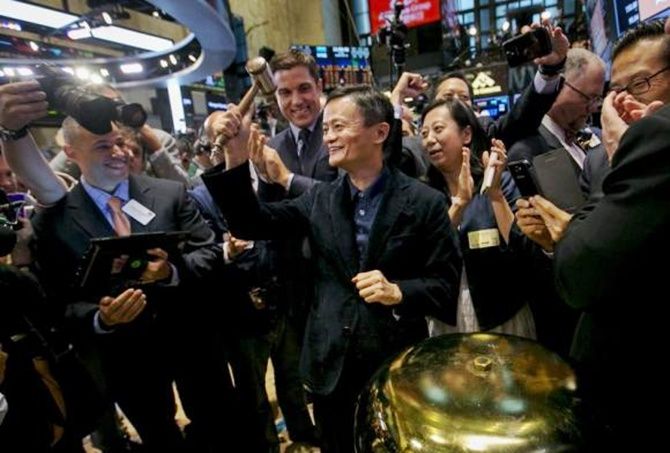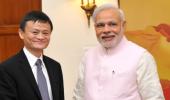Despite flattering parallels between India and China, the way the internet is accessed tells a tale of two very different countries, says Rahul Jacob.

Jack Ma blew through Delhi recently and is already planning a return visit later this month.
The Chinese billionaire and founder of Alibaba is said to be planning a significant investment in business to business e-tailing as well as payment services and logistics companies.
India certainly has plenty of promise. Sales growth in e-commerce was up 27 per cent to almost $4 billion. Like China, it has a 1 billion-plus population.
Everywhere you look, from furniture sites to taxi apps, from online grocery stores to fashion e-tailers, there are articulate entrepreneurs spinning exponential growth stories. Companies like Flipkart are being billed the next Alibaba.
The valuation of Flipkart reflects that venture capitalists are projecting China’s growth patterns in evaluating India’s.
Flipkart is already valued at $11 billion.. Ma should look before he leaps.
On Thursday, the global consultancy AT Kearney released a new global ranking (Read here) of countries with e-commerce potential.
India is not even ranked. India’s $3.8 billion in e-commerce sales last year was just a fraction of the US’ at $238 billion and less than a third of Brazil’s at $13 billion, according to the study.
These paltry sales figures are just the tip of India’s e-commerce mirage.
The country’s internet backbone, which sometimes seems a transplant from the era of IBM mainframes, is part of the problem.
On the day Ma visited Prime Minister Narendra Modi in New Delhi, the United Nations released a survey underlining these anomalies: it said India was one of the least e-commerce friendly places on the planet.
The country ranked 83rd out of 130 countries in the ranking that measured internet users in the country, the availability of secure servers and credit card penetration.
Only 20 million Indians have third-generation mobile services, which is essential for multimedia content.
The average broadband speed is 2 Mbps, putting India 115th globally, which is the lowest in Asia, according to IndiaSpend, citing the US technology company Akamai.
With their eye on listing on Nasdaq just as Alibaba famously did last year, receiving a valuation of $170 billion, Indian entrepreneurs often argue that India is the next China.
It’s a seductive narrative and seasoned investors from Tiger Global (a big investor in Flipkart) to Japan’s Softbank (which invested $800 million in Indian e-commerce in 2014) are placing bets that it might even be true.
The way the internet is accessed tells a tale of two very different countries, however.
In China, about a third of those who go online are “continuously connected” and about 60 per cent check the internet two to four times a day. The AT Kearney study characterises its online buyers as “sophisticated, with well-developed brand aware for and trust in the big names. “
By contrast, Osama Manzar, director of the Digital Empowerment Foundation, told IndiaSpend, that more than 80 per cent of India’s net users are “static users,” which is to say only intermittently connected. Only 2 to 5 per cent of those on the internet in India are regular users, in the sense of using it to conduct their daily lives.
About half of India’s universe of 15 million wired broadband users are corporate users.
India’s primitive financial and physical infrastructure poses daunting challenges for all businesses, but especially e-commerce. Because credit cards are used by only 1.8 per cent of the population, anything from 50 to 80 per cent of purchases are paid via cash on delivery.
Warehouse space in our densely packed cities is next to impossible to obtain, not least because real estate costs often costs what it does in the developed world.
If generating a return on investment seems daunting enough, India’s competitive environment is also much more demanding than China’s was.
For starters, Alibaba, Baidu and the Chinese Twitter, Weibo, initially had little or no domestic competition and certainly none from multinationals.
In India, by contrast, Amazon and Google are already well entrenched. Flipkart is certainly bigger than Amazon in India but the stiff competition is making the company bleed.
To be fair, since it started 20 years ago in Seattle, Amazon itself has had a very hit-and-miss relationship with profitability.
Taking that as its cue, Indian e-commerce entrepreneurs dismiss questions about profits as a sign of a lack of maturity in India.
In the glass-always-brimming world of Indian e-commerce entrepreneurs, the wide use of phones to access the internet rather than computers is called leap-frogging; seven out of eight Indian users access the net on mobile phones because less than 5 per cent of Indians have access to computers.
What this points to is likely lower spending by consumers.
Which is what you would expect from an economy with per capita incomes of $1,500 versus more than $6,000 for China and more than $50,000 in the US.
Perhaps Indians can surmount the slow speeds on their smartphones to transact on the internet if they have enough patience.
But, how will vast sections of the population shop online without the money to pay for the goods on their screens? And, if anecdotal evidence were needed that this is a bubble, India’s government provided it recently.
The Economic Times reported last month that the government told the chairman of the Indian Railway Catering & Tourism Corporation (IRCTC) website to think like an internet entrepreneur.
The government said the railways website, which admittedly is India’s largest e-commerce business, should be “India’s next Flipkart.” Then again, with Flipkart being projected as India’s Alibaba, no claims in India’s parallel internet universe can be termed too outlandish.












 © 2025
© 2025